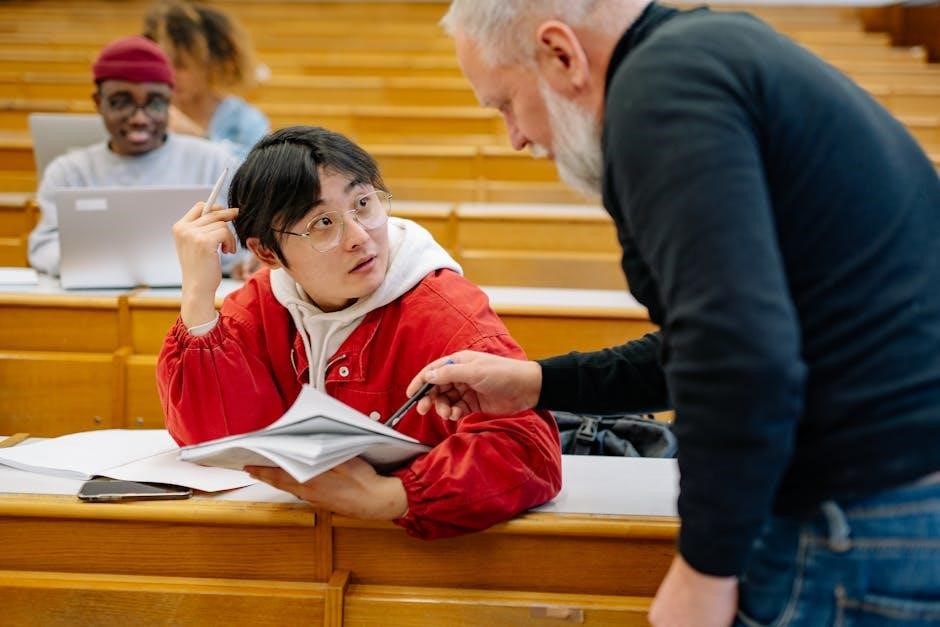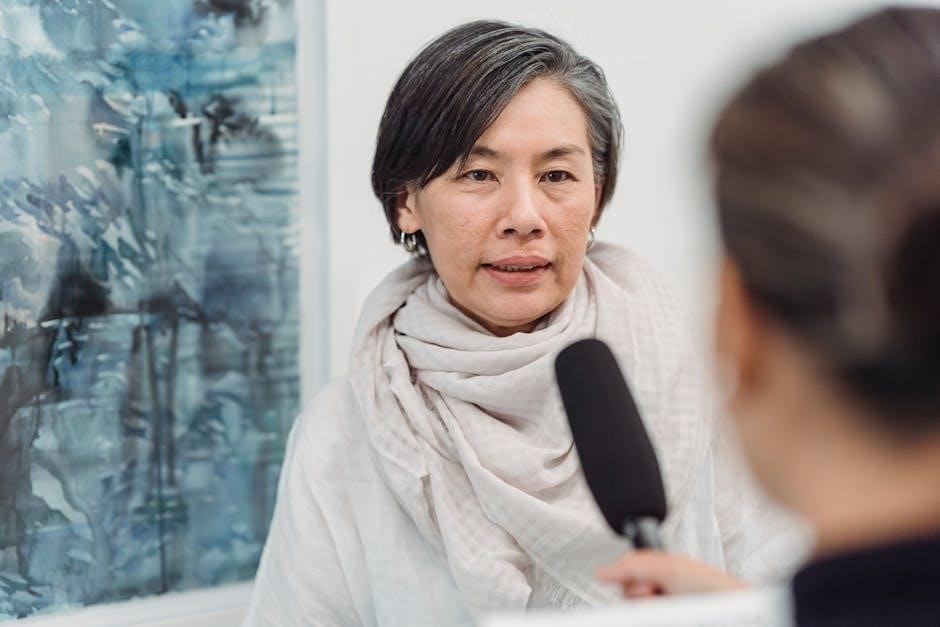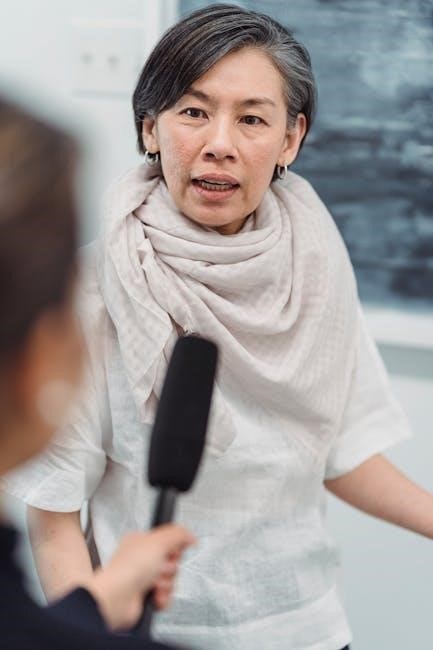Preparing for a principal interview requires understanding key questions and strategies to showcase leadership, vision, and educational expertise. This guide provides insights and examples to help aspiring principals succeed.
1.1 Importance of Preparing for a Principal Interview
Preparing for a principal interview is crucial, as it demonstrates your commitment to leadership and education. Principals play a pivotal role in shaping school culture and academic success, making it essential to showcase your vision, leadership skills, and passion for education. A well-prepared candidate stands out, especially in competitive markets. Researching common questions, practicing responses, and aligning your experience with the school’s values ensures confidence and effectiveness during the interview. This preparation not only highlights your qualifications but also reflects your readiness to lead and inspire a school community.
1.2 Overview of Common Principal Interview Questions
Principal interview questions typically focus on leadership, vision, and educational expertise. Candidates are often asked about their motivation, leadership style, and strategies for building relationships with teachers, students, and parents. Questions may also address handling challenges, staying current with educational trends, and conflict resolution. Additionally, interviewers may inquire about your vision for the school and how you plan to implement it. Being prepared to discuss your experience, problem-solving abilities, and communication skills is essential. Researching the school’s specific needs can also help tailor your responses effectively.

Top Principal Interview Questions and Answers
This section provides a comprehensive overview of key questions and example answers for principal interviews, focusing on leadership, vision, and educational expertise.
2.1 Questions About Your Background and Motivation
Interviewers often ask about your background and motivation to understand your passion for education and leadership. Questions may include, “What inspired you to become an educator?” or “How did your experiences shape your leadership style?” Be prepared to discuss your personal values, influential experiences, and commitment to student success. Highlight how your journey aligns with the school’s mission and your vision for fostering a positive learning environment. Authenticity and clarity are key to showcasing your dedication and suitability for the role.
2.2 Questions About Leadership and Vision
Leadership and vision questions assess your ability to inspire and guide a school community. Expect questions like, “How do you define leadership?” or “What is your vision for this school?” Emphasize your commitment to fostering a positive culture, making data-driven decisions, and promoting academic excellence. Highlight how your vision aligns with the school’s goals and how you will collaborate with teachers, students, and parents to achieve it. Showcase your strategic thinking and ability to lead transformative change, ensuring your response reflects both innovation and practicality. Provide specific examples to illustrate your leadership philosophy and vision for the future.

2.3 Questions About Building Relationships
Questions about building relationships focus on your ability to connect with teachers, students, and parents. Be prepared to discuss strategies for fostering trust, communication, and collaboration. Highlight your approach to active listening, empathy, and responsiveness. Share examples of how you’ve built strong relationships in previous roles, such as through regular meetings, classroom visits, or community events. Emphasize how these relationships contribute to a positive school culture and support student success. Showcase your commitment to creating an inclusive and supportive environment for all stakeholders. Effective relationship-building is key to a thriving school community.
2.4 Questions About Handling Challenges
Questions about handling challenges assess your problem-solving skills and ability to manage difficult situations. Discuss your approach to identifying root causes and implementing solutions. Highlight specific examples, such as resolving conflicts or improving academic performance. Emphasize collaboration, communication, and proactive strategies. Showcase how you remained calm under pressure and led your team effectively. Demonstrate your commitment to finding solutions that benefit the entire school community. Effective problem-solving and resilience are crucial for a principal’s success in overcoming obstacles and fostering a positive school environment. Be prepared to articulate your strategies clearly and confidently;
2.5 Questions About Your Vision for the School
Your vision for the school should inspire and align with its mission. Share a clear, actionable plan that fosters academic excellence, student well-being, and community engagement. Highlight how you will empower teachers, involve parents, and prepare students for future challenges. Emphasize innovation, inclusivity, and continuous improvement. Discuss how you will address modern educational trends while maintaining a focus on student success. Your vision should reflect a commitment to creating a supportive, collaborative, and forward-thinking learning environment that benefits all stakeholders and drives long-term growth.

Strategies for Answering Principal Interview Questions
Use the STAR technique to structure responses, showcasing leadership and problem-solving skills. Highlight communication abilities and align answers with the school’s mission and values to demonstrate fit.
3.1 Using the STAR Technique
The STAR technique is a powerful tool for structuring responses to principal interview questions. It involves describing the Situation, outlining the Task, explaining the Action taken, and highlighting the Result. This method ensures clarity and conciseness, allowing candidates to showcase their problem-solving skills and leadership effectively. For example, when discussing a challenge, describe the context, the goal, the steps taken, and the positive outcome achieved. This approach helps interviewers visualize the candidate’s capabilities and aligns responses with the school’s values and mission.
3.2 Showcasing Leadership Skills
Effectively showcasing leadership skills during a principal interview is crucial. Highlight your ability to inspire and guide others, demonstrating how you foster collaboration and drive results. Emphasize your vision for the school, decision-making abilities, and experience in motivating staff and students. Provide specific examples of successfully leading initiatives or resolving challenges, illustrating your capacity to empower others and create a positive school culture. Show how your leadership style aligns with the school’s mission and values, reinforcing your role as an educational leader.
3.3 Highlighting Communication and Interpersonal Skills
Strong communication and interpersonal skills are essential for a principal to build trust and collaboration within the school community. Emphasize your ability to actively listen, articulate ideas clearly, and adapt your communication style to diverse audiences. Highlight experiences where you effectively mediated conflicts or fostered open dialogue between teachers, students, and parents. Showcase how your approachability and empathy have created a supportive environment, demonstrating your ability to connect with stakeholders at all levels. Provide specific examples to illustrate your skill in building positive relationships and fostering a collaborative culture.
3.4 Demonstrating Problem-Solving Abilities
Demonstrating strong problem-solving skills is crucial for a principal, as it showcases your ability to address challenges effectively. Highlight your analytical thinking, decision-making, and conflict resolution skills. Provide examples of how you’ve identified root causes of issues and implemented successful solutions. Emphasize your proactive approach to anticipating problems and your ability to adapt strategies based on feedback. Use the STAR technique to frame your experiences, illustrating how you’ve resolved complex situations in education, such as budget constraints or student conflicts, to achieve positive outcomes.

Common Principal Interview Questions
Common principal interview questions cover leadership, vision, relationships, and problem-solving. They often include queries about motivation, educational philosophy, and strategies for improving student outcomes and school culture.
4.1 “What Inspired You to Become an Educator and a Principal?”
This question explores your motivation and passion for education. A strong answer highlights personal values, influential experiences, and a commitment to student success. For example:
“I’ve always believed in education’s power to transform lives. Influenced by inspiring teachers, I pursued education to make a similar impact. As a principal, I aim to foster an environment where every student thrives.”
Interviewers seek authenticity and alignment with educational leadership values, so share genuine, specific experiences that shaped your career path.
4.2 “How Do You Define Leadership?”
Leadership is about guiding and inspiring others to achieve a shared vision. It involves setting a positive example, communicating effectively, and making decisions that benefit the team or organization. A leader empowers others, fosters collaboration, and creates an inclusive culture where everyone feels valued. For principals, leadership also means promoting academic excellence, ensuring student well-being, and maintaining a positive school environment. Effective leadership is not about authority but about influencing and supporting others to reach their full potential.
4.3 “How Do You Build Relationships with Teachers, Students, and Parents?”
Building strong relationships with teachers, students, and parents is essential for a positive school environment. Principals should foster trust by being approachable, listening actively, and showing genuine care. Regular communication through meetings, emails, and events helps maintain connections. Encouraging collaboration among staff and involving parents in decision-making strengthens bonds. Principals can also attend school activities to engage with students personally. By being visible, empathetic, and responsive, principals create a supportive community where everyone feels valued and empowered to contribute to the school’s success.
4.4 “How Do You Stay Current with Educational Best Practices?”
To stay current with educational best practices, principals engage in continuous professional development through workshops, conferences, and online courses. They also read educational research, join professional organizations, and collaborate with peers to share innovative strategies. Leveraging technology, such as educational software and digital tools, enhances teaching and learning. Regularly reviewing curriculum updates and participating in district-wide initiatives ensures alignment with modern educational standards. By committing to lifelong learning, principals provide effective leadership and foster a culture of excellence in their schools.
4.5 “How Do You Handle Conflicts or Difficult Situations?”
When handling conflicts, principals prioritize active listening to understand all perspectives. They remain impartial and focus on identifying root causes. Effective communication and empathy are key to de-escalating tensions. Principals may use mediation or collaborative problem-solving to find resolutions that benefit all parties. Timely intervention and follow-up ensure conflicts are resolved constructively. By fostering a culture of respect and openness, principals promote a positive school environment where challenges are addressed proactively and effectively for the well-being of students, staff, and the community.

Example Answers to Principal Interview Questions
Example answers provide clarity on how to articulate leadership, vision, and problem-solving skills effectively, helping candidates showcase their qualifications and confidence during the interview process.
5.1 Example Answer: Motivation for Becoming a Principal
I have always been passionate about education and making a positive difference in the lives of young people. As a child, I had several amazing teachers who inspired me to become an educator and make a similar impact on others. In college, I volunteered at a local elementary school and fell in love with the energy and enthusiasm of the students. I also learned about principals’ important role in creating a positive and supportive learning environment for both students and teachers. This solidified my desire to teach and take on a leadership role as a principal. I believe every student has the potential to succeed, and I am dedicated to creating opportunities for them to reach their full potential.
5.2 Example Answer: Definition of Leadership
To me, leadership is about guiding and inspiring others to achieve a shared vision or goal. It involves setting a positive example, being a strong and effective communicator, and making tough decisions that are in the best interest of the team or organization. As a principal, I believe it is also my role to promote a positive and inclusive culture where all members of the school community feel valued and supported. I believe that true leadership is not about being in charge or having all the answers, but rather about empowering others to achieve their full potential and positively impacting the world around us.
5.3 Example Answer: Building Relationships
Building strong relationships with teachers, students, and parents is essential for fostering a supportive learning environment. As a principal, I prioritize active listening, empathy, and open communication to connect with all stakeholders. Regularly visiting classrooms, attending school events, and being approachable for meetings helps me understand their needs and concerns. By fostering trust and collaboration, I create an inclusive culture where everyone feels valued. This approach not only strengthens relationships but also enhances teamwork and shared accountability for student success and school improvement.
5.4 Example Answer: Staying Current with Education Trends
To stay current with educational trends, I regularly attend professional development workshops, participate in educational webinars, and engage with academic journals. I also leverage online platforms and forums to explore innovative teaching strategies and technologies. By staying informed, I can identify best practices and implement them effectively in our school. For instance, I recently introduced a new project-based learning approach after researching its benefits, which has significantly enhanced student engagement and outcomes. Continuous learning allows me to support both teachers and students in adapting to evolving educational landscapes.
5.5 Example Answer: Conflict Resolution Strategies
When conflicts arise, I employ a structured approach to ensure fair and effective resolution. First, I listen actively to all parties to understand their perspectives. Next, I identify the root cause of the conflict and facilitate open communication to find common ground. For example, in a recent dispute between teachers and parents, I organized a collaborative meeting to address concerns and develop a mutually acceptable solution. By fostering empathy and cooperation, I was able to resolve the issue promptly, reinforcing trust and unity within the school community. This approach ensures that conflicts are turned into opportunities for growth and understanding.

Tips for Acing a Principal Interview
- Research the school and district thoroughly.
- Practice answering common interview questions.
- Demonstrate passion for education and leadership.
- Highlight relevant experience and achievements.
- Follow up with a thank-you note post-interview.
6.1 Researching the School and District
Researching the school and district is crucial to understanding their unique culture, challenges, and goals. Visit the school’s website, review recent news, and familiarize yourself with their mission and vision. Understand the district’s policies, budget, and recent initiatives. This preparation allows you to tailor your responses to their specific needs, demonstrating your genuine interest and alignment with their priorities. Knowing about their programs, achievements, and challenges will help you stand out as a well-prepared candidate who is ready to contribute meaningfully.
6.2 Practicing Common Interview Questions
Practicing common principal interview questions is essential to build confidence and clarity in your responses. Use online resources or guides to identify frequently asked questions about leadership, vision, and challenges. Conduct mock interviews with colleagues or mentors to simulate real scenarios. Record your answers to identify areas for improvement and refine your delivery. The more prepared you are, the more articulate and persuasive you’ll be during the actual interview, showcasing your qualifications and readiness for the role.
6.3 Demonstrating Passion and Vision
Demonstrating passion and vision is critical during a principal interview. Share personal anecdotes that highlight your dedication to education and student success. Clearly articulate your vision for the school, ensuring it aligns with the institution’s goals. Discuss how you plan to inspire students, support teachers, and engage the community. Show enthusiasm for innovative practices and commitment to fostering a positive school culture. Your passion and vision will help the interview panel see you as a transformative leader capable of driving meaningful change and achieving excellence.
6.4 Highlighting Relevant Experience
Highlighting relevant experience is essential to showcasing your suitability for the principal role. Emphasize achievements in leadership, curriculum development, and community engagement. Provide specific examples of improving student outcomes, managing staff, and fostering partnerships with parents. Align your experience with the school’s mission and goals, demonstrating how your background prepares you to address their unique challenges. Quantify accomplishments, such as improved test scores or successful program implementations, to illustrate your impact. This helps the interview panel envision your ability to lead effectively and drive positive change in their school.
6.5 Following Up After the Interview
A well-timed follow-up after the interview demonstrates professionalism and enthusiasm. Send a thank-you note within 24 hours, expressing gratitude for the opportunity and reiterating your interest in the role. Personalize the message by referencing key discussion points, such as shared goals or challenges. This not only reinforces your suitability but also keeps you top of mind for the hiring committee. Additionally, inquire about the next steps in the process to show proactive engagement and eagerness to contribute to the school’s success.

The Principal Interview Process
The principal interview process varies by district but often includes multiple rounds with stakeholders. The search committee plays a key role in evaluating candidates and making recommendations.
7.1 Understanding the Interview Panel
The interview panel for a principal position typically includes a diverse group of stakeholders, such as district administrators, school board members, teachers, parents, and community leaders. Each member brings unique perspectives and priorities, focusing on assessing the candidate’s leadership skills, educational vision, and ability to foster collaboration. Understanding the panel’s composition helps tailor responses to address various interests, ensuring alignment with the school’s mission and community expectations. This diverse representation ensures a comprehensive evaluation of the candidate’s suitability for the role.
7.2 Preparing for Multiple Rounds of Interviews
Principal interviews often involve multiple rounds, starting with initial screenings and progressing to panel interviews with stakeholders. Each round may focus on different aspects of leadership, vision, and experience. To succeed, candidates should tailor their responses to address the specific interests of each group, such as district goals or community expectations. Practicing consistency in messaging and demonstrating adaptability is crucial. Staying organized and prepared for varied formats, from one-on-one meetings to presentations, ensures a strong performance throughout the process; This multi-stage approach allows for a comprehensive assessment of the candidate’s fit for the role.

7.3 The Role of the Search Committee
The search committee plays a pivotal role in the principal hiring process, responsible for identifying and evaluating candidates. This committee typically includes educators, parents, and community members. Their primary tasks involve reviewing applications, conducting interviews, and recommending top candidates to the school board. The committee assesses alignment with the school’s mission and leadership qualities. Their collective input ensures a well-rounded evaluation, reflecting diverse perspectives. A transparent and structured approach by the committee fosters trust and fairness in the selection process, ultimately contributing to the success of the new principal.
7.4 Timeline for Decision-Making
The decision-making timeline for principal positions varies by district but typically follows a structured process. After interviews, the search committee compiles feedback and submits recommendations to the school board. The board then reviews candidates and makes a final decision, often within 1-3 weeks post-interview. Candidates are notified shortly after, with successful applicants receiving formal offers. The timeline may be influenced by factors like district policies or urgent hiring needs. Communication with candidates is key to maintaining transparency throughout the process.

Effective preparation and a clear vision are key to succeeding in a principal interview. Showcase leadership, communication, and problem-solving skills to stand out and inspire confidence.
8.1 Final Thoughts on Principal Interview Preparation
Preparing for a principal interview is a critical step in advancing your educational career. Emphasize your passion for education, leadership vision, and commitment to student success. Use strategies like the STAR technique to structure responses effectively. Highlight your ability to build strong relationships, manage challenges, and stay current with educational trends. Confidence, authenticity, and a clear vision will set you apart. Thorough preparation and practice ensure you present yourself as a capable and inspiring leader, ready to make a meaningful impact as a principal.
8.2 Encouragement for Aspiring Principals
Pursuing a principal role is a noble endeavor that allows you to shape the future of education. Embrace the opportunity to inspire students, teachers, and the community. Stay focused on your vision for student success and school improvement. Remember, your passion and dedication will make a lasting impact. Trust in your preparation and experience, and approach the interview with confidence. Your leadership has the power to create a ripple effect of positive change in the lives of others. Go forth with determination and make a difference!
